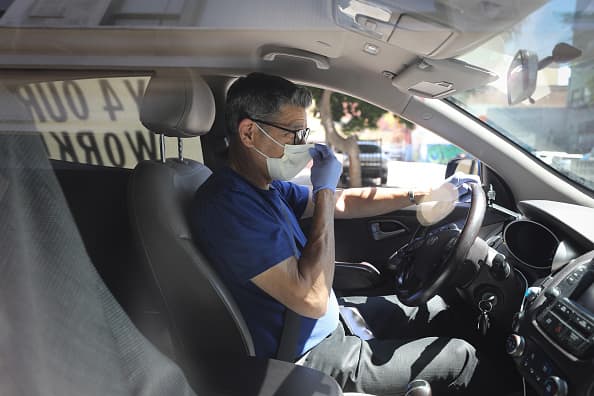A driver adjusts his face mask as Uber and Lyft drivers with Rideshare Drivers United and the Transport Workers Union of America conduct a ‘caravan protest’ outside the California Labor Commissioner’s office amidst the coronavirus pandemic on April 16, 2020 in Los Angeles, California. (Photo by Mario Tama/Getty Images)
Mario Tama
Some gig workers may be scratching their heads at what, for many, has become a roundabout process to get unemployment benefits.
In yet another wrinkle, California is issuing letters to gig workers who applied for unemployment benefits indicating that they are entitled to $0.
For some, like Ismael Perez, who made about $60,000 last year as a full-time Uber and Lyft driver, the letter was confusing.
"When I got the [unemployment] award letter, all it said was 'zero' everywhere," said Perez, 42, who lives in La Habra Heights, California, a city in Los Angeles County.
The same happened to Dexter Eng, 45, a full-time Uber driver from Campbell, California, in the San Francisco Bay Area. His award statement from the state said he was entitled to $0 in benefits.
Perez, for his part, was baffled by his letter. "I thought, 'Is this actually accurate?'" he said.
The short answer, in many circumstances, is yes.
"Receiving a $0 award notice doesn't necessarily mean someone is ineligible for regular [unemployment insurance] benefits," California's Employment Development Department, or EDD, said in an e-mail.
The situation seems to apply to a broad swath of workers in the state, encompassing full-time gig workers, self-employed individuals, independent contractors and others.
Such workers living in other states may be experiencing similar confusion, based on their state's administration of unemployment benefits.
Self-employed workers, independent contractors and others are newly eligible to collect unemployment benefits as a result of the $2.2 trillion federal coronavirus relief law enacted last month.
More from Personal Finance:
Beware of scammers as paper stimulus checks hit the mail
Student loan borrowers still seeing wages garnishedCard issuers cutting credit limits without warning
The federal government is funding unemployment benefits for these newly eligible Americans as part of a new program — called Pandemic Unemployment Assistance — that's separate from states' traditional unemployment insurance framework.
Perhaps counterintuitively, gig workers and other self-employed individuals in many states must apply for a state's traditional unemployment insurance benefits and be denied in order to be eligible to receive Pandemic Unemployment Assistance, according to employment experts.
California's $0 award notices are a way of denying traditional unemployment benefits to workers, according to Bill Sokol, a Bay Area-based labor attorney for Weinberg Roger & Rosenfeld.
It means the workers didn't have wages from traditional W-2 employment, which is typically what states use to determine benefits eligibility and size.
These workers will be eligible to apply for Pandemic Unemployment Assistance on April 28 when applications open online in California, Sokol said.
In California, these workers will be eligible for a minimum $167 a week (for up to 39 weeks) plus an additional $600 a week through July 25.
In a sign of how many workers are expected to flood the new program, California's unemployment office said it "will likely rival the size of the regular UI program the EDD already administers."
Roughly 26 million Americans filed for unemployment benefits in the five weeks through April 18, erasing all the jobs created in the decade since the Great Recession.
Of course, receiving an award letter for $0 doesn't mean workers will necessarily be eligible to collect unemployment through the new PUA framework.
Such a letter could apply to workers in different circumstances, according to California's Employment Development Department.
It may mean the state needs to verify your identity for the wages reported. If so, the state will mail a request to verify your identity.
You may also have been misclassified by your employer as an independent contractor instead of an employee, or your wage information may have been inadvertently transposed when your employer reported your information to the EDD, according to the agency.
If so, or if you believe the wage record isn't accurate, correct the wages on the award notice and send copies of your W-2, Form 1099 or a paycheck stub to the address on the front of the notice, EDD said.


